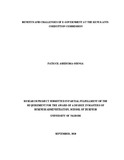| dc.description.abstract | The introduction of ICT can reduce corruption by improving the enforcement of rules, lessening discretion by public officials, and increasing transparency. What is emerging now is a platform known as e-government which is the utilization of ICTs to automate both internal operations within the government and the external service provisions to the citizens. E-government comes with benefits such as improved efficiency and challenges such as high component and services costs. However, benefits are still outweighed by technological and government organizational challenges.
It is to this effect that this study was set out to investigate the extent of e-government utilization by Kenya Anti-Corruption Commission (KACC), to establish benefits of egovernment as applied by the Kenya Anti-Corruption Commission and as well analyze the challenges. This study used a case study design. The target population involved the main fourteen divisions in KACC organizational structure that includes 214 members of staff. The respondents ofthe study were randomly sampled from the target population. 14 senior officers in charge of departments were purposively selected bringing the sample size of the study to 38 respondents.
The primary data was collected from the respondents using a questionnaire. It was then coded and analyzed with the help of the Statistical Package for Social Sciences (SPSS). The analysis used descriptive statistics such as mean scores and standard deviations and results presented using tables, graphs and charts for ease of understanding. From the findings, this study recommends that KACC should initiate a top bottom approach policy to ensure proper implementation of e-governance. The government should empower the public who are the main clients of the KACC to enable them increase the usage levels of ICT, its improved access and technological diffusion. KACC should provide more information about their services through e-governance as this will ensure accurate quality information directed to the public and interested parties. | en_US |

